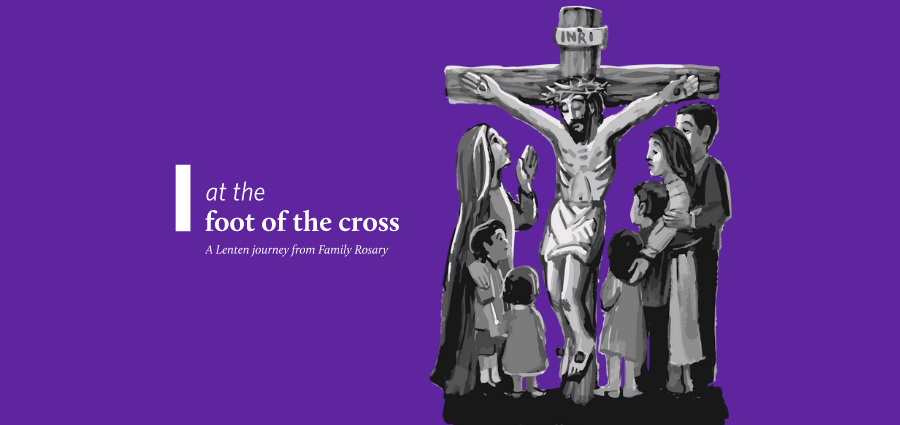
By: Nicole O'Leary on March 30th, 2022
A Gift Freely Given
A young couple, overjoyed to learn that they are expecting a child, undertakes a series of happy preparations which require the complete re-ordering of their lives. When their daughter is born, she will be the immediate beneficiary of these preparations, but years will pass before she is able to offer even a word or a gesture of gratitude.
It is no coincidence that both Saints Peter and Paul addressed various recipients of their letters as “infants” and the early Church compared the newly-baptized to spiritual children born from the baptismal waters. Our earthly lives begin in helplessness and dependency; we contribute neither to our conception nor to the initial provision of our bodily necessities. Likewise, in the life of the spirit, God has marvelously arranged everything for His children in advance. The baptized soul, like the daughter of the newlywed couple, is the recipient of innumerable unmerited gifts which precede her.
The Christian life is intended to be a continual response to these gifts. It is—or, at least, it can be—a single upward movement of praise and thanksgiving. A certain phrase from the Gospel of Matthew, however, illuminates a particular quality that should characterize our gratitude. Instructing the Apostles in the duties of their ministry, Jesus offers the following words:
“You received without pay, give without pay,” (Mt. 10:8).
In response to God’s abundant generosity, we are to make a return of generosity. But although our spiritual birth has come without cost to us, it was not obtained without cost to Him—any crucifix serves to remind us of this. In Christ and through His Cross, Saint Paul writes, “we have redemption, the forgiveness of sins,” (Col. 1:14). Eternal life with God is available to us because He has won forgiveness for us. Thus, each time a soul is washed of original and personal sin in Baptism, and each time we bring our transgressions to the Lord in Confession, the power of these sacraments to forgive flows from the same single wellspring of divine life.
God’s forgiveness is, therefore, the doorway to entering into that friendship with Him for which He has created us—and for which, we discover, we have also been searching. It is the longing of every contrite soul to hear the words of absolution, assured once again that Divine Love, impelled by love to offer Himself on Calvary, is still about the work of forgiving.
If we understood what it cost the Lord to forgive, we might also begin to comprehend more deeply what must form the substance of our response. What, in fact, are we asked to “give without pay”? Perhaps it is not, first and foremost, those deeds which we describe as “charitable works.” Nor is it a frenzy of apostolic labors made in the name of "evangelization." Assuredly, the corporal and spiritual works of mercy are indispensable. But if they are to bear fruit—since God Himself is the source of all life—they must flow from a heart that belongs to Him. And this will only be possible if that heart has accepted and incorporated His gift of forgiveness.
The practical application of this is clear: our return to the Lord for forgiving our sins must include a firm and generous decision never to sin again.
How difficult this is! And yet, to sidestep our responsibility would be, in effect, to disdain God’s gift. To approach the Lord in the Sacrament of Confession is to ask Him humbly for the pardon that He has already purchased and is anxious to bestow; but if we request a gift only to dispose of it promptly, we appreciate neither the value of the gift nor the generosity of the giver.
However many times we may, in fact, sin again, the desire and the decision to amend are necessary, not only to satisfy the requirement of contrition (cf. CCC 1450-51), but also in order that the sacrament might become what it is meant to be: the encounter between a soul daring to believe in the goodness of her God and God who wishes to draw that soul to Himself. In this way, the sacrament becomes a sacrifice of praise and an expression of love.
Undoubtedly, to put our resolution into practice will cost us. Although we are to give “without pay,” we are never told that a price will not be exacted from us for our generosity. That is what we saw when we examined the Crucifix: the gift freely given was not purchased for free. Our efforts will nevertheless become the means by which we invite the Lord to take possession of our hearts. In this way, we who are infants will mature into adulthood—not in a juvenile pursuit of independence, but so that, in our dependence before Him, we may offer Him a fitting hymn of praise.
Ask any of the saints and the answer will be the same: it’s worth it.
This article originally appeared in The Bell Ringer, Saint Francis Xavier Parish, Hyannis, MA. January 1, 2022.
